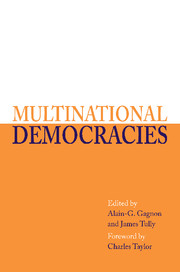Book contents
- Frontmatter
- Contents
- Notes on the contributors
- Foreword by Charles Taylor
- Acknowledgements
- Introduction
- Part I Justice and stability in multinational democracies
- 1 So many nations, so few states: territory and nationalism in the global era
- 2 Political stability in multinational democracies: comparing language dynamics in Brussels, Montreal and Barcelona
- 3 Justice and stability in multinational societies
- 4 Political liberalism in multinational states: the legitimacy of plural and asymmetrical federalism
- Part II Struggles over recognition and institutions of accommodation
- Part III Modes of reconciliation and conflict management
- References
- Index
2 - Political stability in multinational democracies: comparing language dynamics in Brussels, Montreal and Barcelona
Published online by Cambridge University Press: 06 October 2009
- Frontmatter
- Contents
- Notes on the contributors
- Foreword by Charles Taylor
- Acknowledgements
- Introduction
- Part I Justice and stability in multinational democracies
- 1 So many nations, so few states: territory and nationalism in the global era
- 2 Political stability in multinational democracies: comparing language dynamics in Brussels, Montreal and Barcelona
- 3 Justice and stability in multinational societies
- 4 Political liberalism in multinational states: the legitimacy of plural and asymmetrical federalism
- Part II Struggles over recognition and institutions of accommodation
- Part III Modes of reconciliation and conflict management
- References
- Index
Summary
Can multinational states be stable in the long run? The question has long interested philosophers and social scientists. For over a century, liberals and socialists shared the assumption that intra-state cultural identities were transitory, characteristic of a specific stage of historical development and would lose their salience with the onset of modernization or socialism. Even the Soviet socialist leaders, who actually institutionalized cultural differences in the 1920s by creating ‘ethnically’ defined republics, did so with the belief that economic equality under developed socialism would inevitably make the political status of cultures irrelevant (Connor 1984). Among those who assumed, on the contrary, that the non-conflictual blending of sundry cultures into a state-sponsored, ‘nationwide’ culture is not the only path to state building, two traditions formed regarding the stability of states in a multicultural setting. They could be called the pessimist and the optimist schools.
The pessimist school can be traced back to J. S. Mill's classic statement that a multilingual population cannot generate a united public opinion, a necessary condition for the maintenance of a representative government (Mill [1860] 1995). Almost a century later, Almond (1956) incorporated this insight in his typology of political systems, with the assumption that political stability requires cultural homogeneity. In a colonial setting, a similar argument was developed in J. S. Furnivall's concept of a plural society, where cultural segments display incompatible values and can only cohabit politically through externally-induced order, i.e. a colonial government (Furnivall 1948).
- Type
- Chapter
- Information
- Multinational Democracies , pp. 65 - 89Publisher: Cambridge University PressPrint publication year: 2001
- 11
- Cited by



